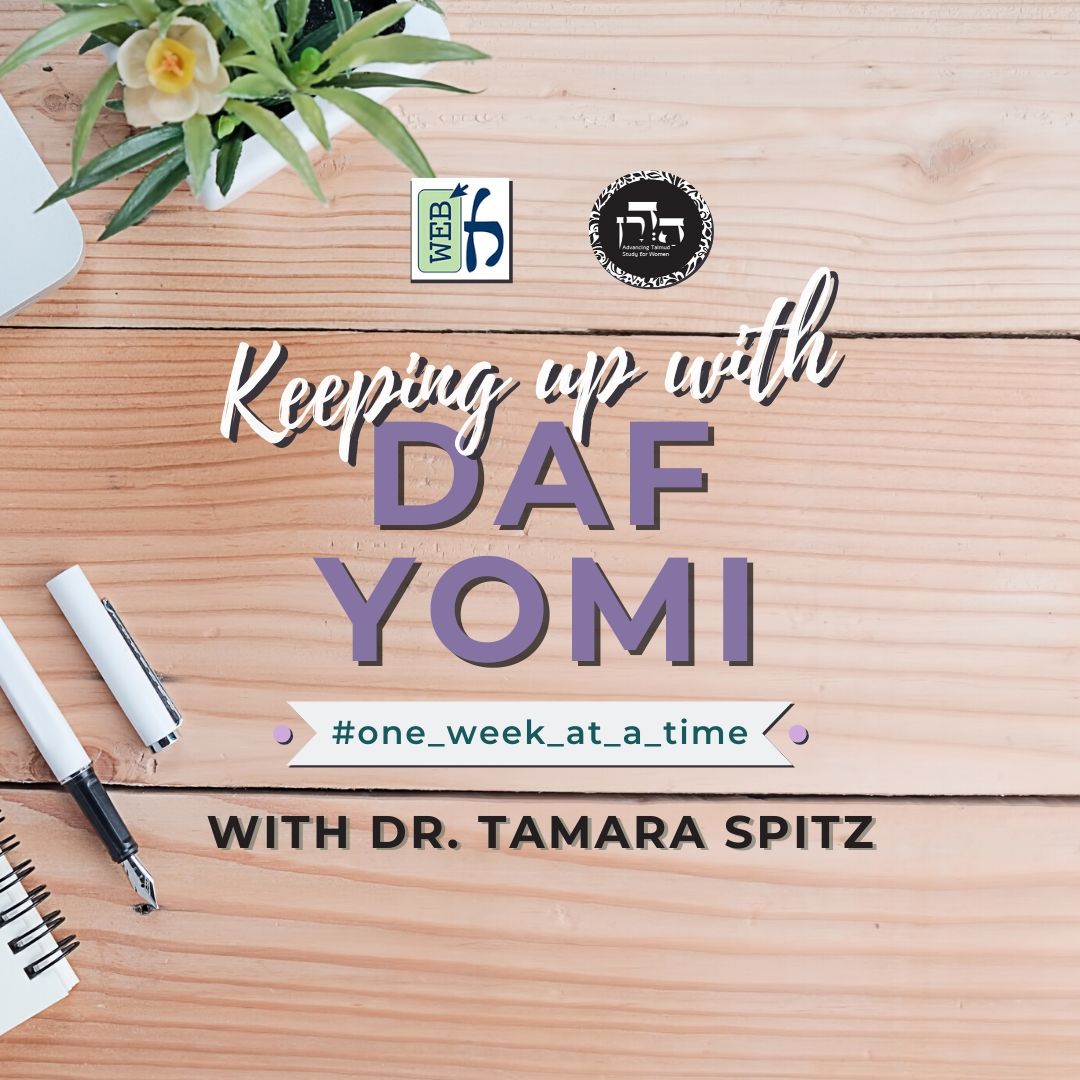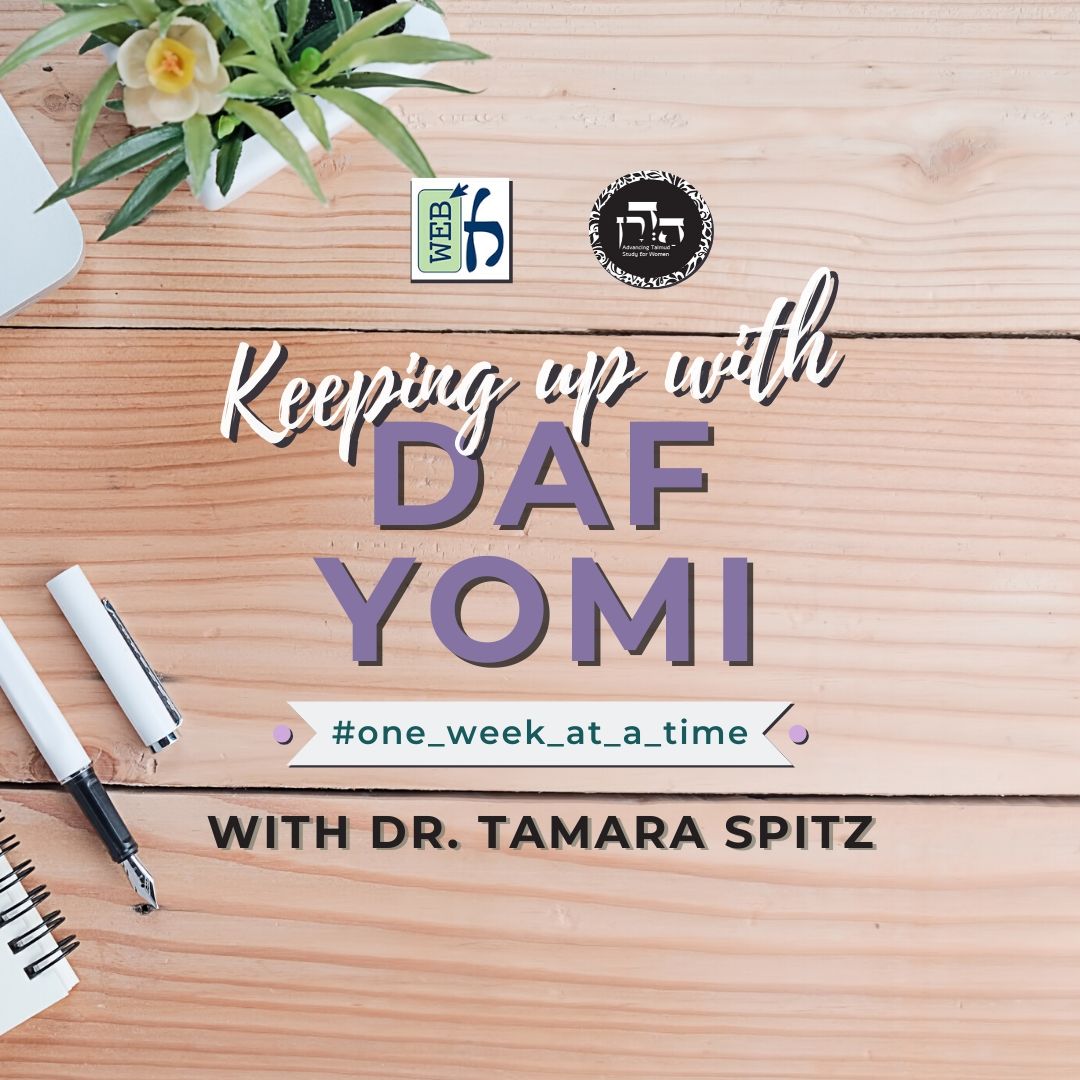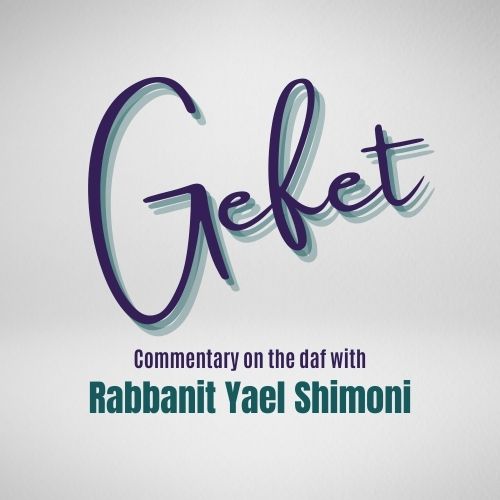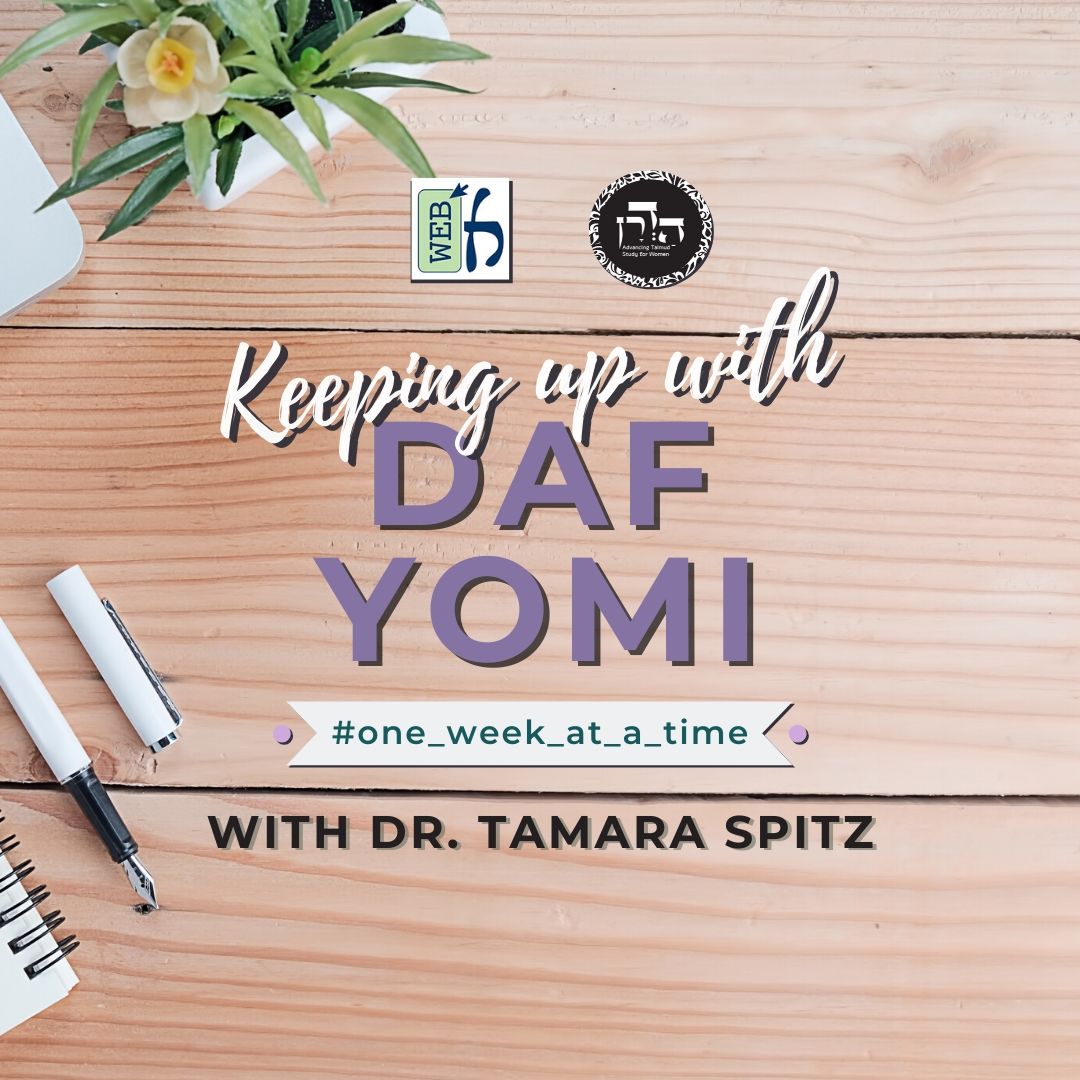This week’s learning is sponsored for the merit and safety of Haymanut (Emuna) Kasau, who was 9 years old when she disappeared from her home in Tzfat two years ago, on the 16th of Adar, 5784 (February 25, 2024), and whose whereabouts remain unknown.
This week’s learning is dedicated of the safety of our nation, the soldiers and citizens of Israel, and for the liberation of the Iranian people. May we soon see the realization of “ליהודים היתה אורה ושמחה וששון ויקר”.
This week’s learning is sponsored for the merit and safety of Haymanut (Emuna) Kasau, who was 9 years old when she disappeared from her home in Tzfat two years ago, on the 16th of Adar, 5784 (February 25, 2024), and whose whereabouts remain unknown.
Want to dedicate learning? Get started here:


Today’s daily daf tools:
This week’s learning is sponsored for the merit and safety of Haymanut (Emuna) Kasau, who was 9 years old when she disappeared from her home in Tzfat two years ago, on the 16th of Adar, 5784 (February 25, 2024), and whose whereabouts remain unknown.
This week’s learning is dedicated of the safety of our nation, the soldiers and citizens of Israel, and for the liberation of the Iranian people. May we soon see the realization of “ליהודים היתה אורה ושמחה וששון ויקר”.
This week’s learning is sponsored for the merit and safety of Haymanut (Emuna) Kasau, who was 9 years old when she disappeared from her home in Tzfat two years ago, on the 16th of Adar, 5784 (February 25, 2024), and whose whereabouts remain unknown.
Today’s daily daf tools:
Delve Deeper
Broaden your understanding of the topics on this daf with classes and podcasts from top women Talmud scholars.
New to Talmud?
Check out our resources designed to help you navigate a page of Talmud – and study at the pace, level and style that fits you.
The Hadran Women’s Tapestry
Meet the diverse women learning Gemara at Hadran and hear their stories.
Bekhorot 60
לֹא יֹאמַר: אֶבְרוֹר עֲשָׂרָה וְאֶטּוֹל מֵהֶן אֶחָד וְהַשְּׁאָר פְּטוּרִים, אֶלָּא כּוֹנְסָן לַדִּיר, וּמוֹצִיא עֲשָׂרָה, וְנוֹטֵל מֵהֶן אֶחָד, וְהַשְּׁאָר מִצְטָרְפִין לְגוֹרֶן אַחֵר.
he may not say: I will separate ten and bring them into the pen, and I will take one of them as animal tithe, and the rest will be exempt. Rather, he must bring them all into the pen and remove ten of them by causing them to emerge from the opening, and take one of them, the tenth one, as animal tithe. And the remainder combine with animals born later, to be tithed in another designated time of gathering.
וְהָתַנְיָא: תִּשְׁעָה עָשָׂר טְלָאִים, לֹא יֹאמַר: אֶבְרוֹר עֲשָׂרָה וְאֶטּוֹל מֵהֶן אֶחָד, וְהַשְּׁאָר פְּטוּרִין, אֶלָּא כּוֹנְסָן לַדִּיר, וּמוֹצִיא עֲשָׂרָה וְנוֹטֵל מֵהֶן אֶחָד, וְהַשְּׁאָר פְּטוּרִין.
The Gemara asks: But isn’t it taught in a baraita that if one has nineteen lambs he may not say: I will separate ten and bring them into the pen, and I will take one of them as animal tithe and the rest will be exempt; rather, he must bring them all into the pen and remove ten of them by causing them to emerge from the opening, and take one of them, the tenth one, and the remainder are exempt? According to this baraita, the remainder are not combined with animals born later.
תַּרְגְּמַהּ רַב הוּנָא בַּר סְחוֹרָה קַמֵּיהּ דְּרָבָא בְּרִיגְלָא: בְּדִיר שֶׁיֵּשׁ לוֹ שְׁנֵי פְתָחִים עָסְקִינַן, וְיָצְאוּ תִּשְׁעָה בְּפֶתַח זֶה וְתִשְׁעָה בְּפֶתַח זֶה, דְּהַאיְךְ חַד חָזֵי לְהָכָא וּלְהָכָא.
Rav Huna bar Seḥora interpreted the baraita before Rava at the time of the Festival discourse: We are dealing with a pen that has two openings. And nine of the lambs emerged through this opening and nine of them went out through that opening, and this last one remaining in the pen is fit to come out here or to come out there. Therefore, all the lambs emerged as part of a tally fit to reach ten.
וְלִישַׁנֵּי לֵיהּ: כְּגוֹן שֶׁמָּנָה תִּשְׁעָה, וְכִי מְטָא עֲשָׂרָה קָרֵי ״חַד״ מֵרֵישָׁא! קָסָבַר: עֲשִׂירִי מֵאֵלָיו קָדוֹשׁ.
The Gemara challenges: But let him teach instead that the baraita is referring to a case where he counted nine, and when the tenth lamb arrived to be counted he called it number one and began counting again from the start. In such a case he designated only the nineteenth lamb that emerged as number ten, and therefore all the other lambs are exempt. The Gemara explains that Rav Huna bar Seḥora holds that the tenth animal to come out of the pen is sanctified of its own accord, even if it was designated as number one.
וְלִישַׁנֵּי לֵיהּ בְּגוֹרֶן, וּמְנָאָן זוּגוֹת זוּגוֹת! קָסָבַר: עֲשִׂירִי לְמִנְיָן בְּהֵמוֹת הוּא קָדוֹשׁ.
The Gemara challenges: But let him teach instead that the baraita is referring to a case of a designated time for gathering the animals, and that the pen has only one opening, but he counted them pair by pair, i.e., he called the first pair number one, the second pair number two, and so on. In this manner, the nineteenth lamb would be designated as number ten and thereby exempt the others. The Gemara explains that Rav Huna bar Seḥora holds that the tenth according to the number of animals is sanctified, regardless of how he counts them. Accordingly, one of the fifth pair would be the tithed animal, and the remaining nine would not be considered part of a tally fit to reach ten.
אָמַר רַב נַחְמָן בַּר יִצְחָק: זְכַאי אִימֵּיהּ דְּרַב הוּנָא בַּר סְחוֹרָה, דְּשַׁנִּי לֵיהּ שְׁמַעְתָּא בְּרִיגְלָא כִּשְׁמַעְתֵּיהּ.
Rav Naḥman bar Yitzḥak said with regard to this incident: The mother of Rav Huna bar Seḥora merited to give birth to such a son, who explained the halakha before Rava at the time of the Festival discourse in accordance with Rava’s own halakha.
מַתְנִי׳ יָצְאוּ שְׁנַיִם כְּאַחַת — מוֹנֶה אוֹתָם שְׁנַיִם שְׁנַיִם, מְנָאָן אֶחָד — תְּשִׁיעִי וַעֲשִׂירִי מְקוּלְקָלִין.
MISHNA: If two animals emerged as one, one counts them as twos, i.e., as though they came out one after the other. If he mistakenly counted two of the animals at the beginning or in the middle of the ten as one, and then continued his count, the ninth and the tenth are flawed, as he called the tenth: Ninth, and he called the eleventh: Tenth.
קָרָא לַתְּשִׁיעִי ״עֲשִׂירִי״, וְלָעֲשִׂירִי ״תְּשִׁיעִי״, וְלָאַחַד עָשָׂר ״עֲשִׂירִי״ — שְׁלָשְׁתָּן מְקוּדָּשִׁין: הַתְּשִׁיעִי נֶאֱכָל בְּמוּמוֹ, וְהָעֲשִׂירִי מַעֲשֵׂר, וְאַחַד עָשָׂר קָרֵב שְׁלָמִים וְעוֹשֶׂה תְּמוּרָה, דִּבְרֵי רַבִּי מֵאִיר.
If he mistakenly called the ninth: Tenth, and the tenth: Ninth, and the eleventh: Tenth, the three of them are sacred, although each has a different halakhic status. The ninth is eaten in its blemished state; and the tenth is animal tithe, which is sacrificed in the Temple and eaten by its owner; and the eleventh is sacrificed as a peace offering, from which the breast and the thigh are given to the priest. And the eleventh renders a non-sacred animal that is exchanged for the peace offering consecrated as a substitute and he sacrifices it as a peace offering; this is the statement of Rabbi Meir.
אָמַר רַבִּי יְהוּדָה: וְכִי יֵשׁ תְּמוּרָה עוֹשָׂה תְּמוּרָה? אָמְרוּ מִשּׁוּם רַבִּי מֵאִיר: אִילּוּ הָיָה תְּמוּרָה — לֹא הָיָה קָרֵב. קָרָא לַתְּשִׁיעִי ״עֲשִׂירִי״, וְלָעֲשִׂירִי ״עֲשִׂירִי״, וְלָאַחַד עָשָׂר ״עֲשִׂירִי״ — אֵין אַחַד עָשָׂר מְקוּדָּשׁ. זֶה הַכְּלָל: כֹּל שֶׁלֹּא נֶעֱקַר שֵׁם עֲשִׂירִי מִמֶּנּוּ, אֵין אַחַד עָשָׂר מְקוּדָּשׁ.
Rabbi Yehuda said: The eleventh animal itself, which he called tenth, is a substitute for animal tithe, and does a substitute render another animal a substitute? Everyone agrees that a substitute is created only in exchange for an originally consecrated animal. The Sages said in the name of Rabbi Meir: The eleventh animal is not considered a substitute for the animal tithe, since if it were a substitute it would not be sacrificed, as the substitute for an animal tithe is not sacrificed. If one called the ninth animal: Tenth, and the tenth: Tenth, and the eleventh: Tenth, the eleventh is not consecrated. This is the principle: In any situation where the name of the tenth was not removed from the tenth animal, the eleventh that was called the tenth is not consecrated.
גְּמָ׳ אָמַר רַבִּי יוֹחָנָן: מְנָאָן זוּגוֹת זוּגוֹת, קִינְטָרִין קִינְטָרִין — עֲשִׂירִי לְמִנְיָנוֹ הוּא קָדוֹשׁ.
GEMARA: Rabbi Yoḥanan says: If one counted the animals pair by pair, i.e., he called the first pair: One, and the second pair: Two, and so on, or if one counted them hundred [kinteran] by hundred, the tenth according to his number is sanctified.
״לְמִנְיָנוֹ״ מַאי? רַב מָארִי אָמַר: לַמִּנְיָן שֶׁלּוֹ הוּא קָדוֹשׁ, רַב כָּהֲנָא אָמַר: לְמִנְיַן בְּהֵמוֹת הוּא קָדוֹשׁ.
The Gemara asks: When Rabbi Yoḥanan says that the tenth is sanctified according to his number, what does he mean? Rav Mari says: It is sanctified according to his counting, i.e., all the animals in whichever pair or group he calls: Ten, are sanctified, e.g., the tenth pair, which consists of the nineteenth and twentieth animals. Rav Kahana says: It is sanctified according to the number of animals, regardless of how he designates them.
תְּנַן: יָצְאוּ שְׁנַיִם כְּאַחַת — מוֹנֶה אוֹתָן שְׁנַיִם שְׁנַיִם. מְנָאָן אֶחָד — תְּשִׁיעִי וַעֲשִׂירִי מְקוּלְקָלִין.
The Gemara cites support for Rav Mari’s opinion. We learned in the mishna: If two animals emerged as one, one counts them as twos. If he mistakenly counted a pair of animals in the middle as one and continued his count, the ninth and the tenth are flawed, as he called the tenth: Ninth, and the eleventh: Tenth.
בִּשְׁלָמָא לְמַאן דְּאָמַר: לַמִּנְיָן שֶׁלּוֹ הוּא קָדוֹשׁ, מִשּׁוּם הָכִי הָווּ תְּשִׁיעִי וַעֲשִׂירִי מְקוּלְקָלִין, וְלָעֲשִׂירִי קָא קָרֵי לֵיהּ ״תְּשִׁיעִי״, וְלָאַחַד עָשָׂר ״עֲשִׂירִי״. אֶלָּא לְמַאן דְּאָמַר: לְמִנְיַן בְּהֵמוֹת הוּא קָדוֹשׁ, לַתְּשִׁיעִי ״תְּשִׁיעִי״ קָא קָרֵי לֵיהּ, וְלָעֲשִׂירִי ״עֲשִׂירִי״ קָא קָרֵי לֵיהּ!
Granted, according to the one who says: It is sanctified according to his counting, i.e., Rav Mari, it is due to that reason that the ninth and the tenth are flawed, because the number by which one designates them is significant, and he called the tenth animal the ninth, and the eleventh he designated as tenth. But according to the one who says that the animal is sanctified according to the number of animals regardless of how the owner designates each one, i.e., Rav Kahana, why are they flawed? It should be considered as though he called the ninth animal the ninth, and the tenth animal he called: Tenth.
אָמַר לָךְ רַבִּי יוֹחָנָן: כִּי אָמֵינָא אֲנָא — הֵיכִי דְּאִיכַּוֵּין לְאַפּוֹקֵי זוּגוֹת זוּגוֹת, הֵיכָא דִּנְפַק מִמֵּילָא — לָא.
The Gemara answers that according to Rav Kahana, Rabbi Yoḥanan could have said to you: When I said the designation goes according to the animal I was referring only to a case where he intended to take out the animals pair by pair, and he did not err. In such a case his designation is nullified and the animals are sanctified in accordance with the order they left the pen. But with regard to a case where the animal emerged by itself and the owner miscounted I did not say the designation goes according to the number of the animal, as the Torah explicitly includes a case where the sanctification follows a mistaken designation (see 60b).
תָּא שְׁמַע: מְנָאָן לְמַפְרֵעַ — עֲשִׂירִי שֶׁבְּמִנְיָן הוּא קָדוֹשׁ. בִּשְׁלָמָא לְמַאן דְּאָמַר לְמִנְיַן בְּהֵמוֹת הוּא קָדוֹשׁ — שַׁפִּיר, אֶלָּא לְמַאן דְּאָמַר לַמִּנְיָן שֶׁלּוֹ הוּא קָדוֹשׁ, עֲשִׂירִי ״חַד״ קָרֵי לֵיהּ!
The Gemara suggests: Come and hear another proof from a baraita: If one counted them backward, i.e., ten, nine, eight, and so on, the tenth animal in the numbering, which he designated as number one, is sanctified. Granted, according to the one who says that the tithe is sanctified according to the number of animals regardless of how he designates each animal, i.e., Rav Kahana, this works out well, as the tenth animal is sanctified. But according to the one who says it is sanctified according to his counting, i.e., Rav Mari, why is the tenth animal sanctified? After all, he called the tenth animal number one.
אָמַר רָבָא: הוֹאִיל וְאִיתֵיהּ בְּמִנְיָנָא פָּרְסָאָה, דְּקָרוּ לְעַשְׂרָה ״חַד״.
Rava said: The tenth animal is sanctified according to Rav Mari because it has been counted as number ten in Persian counting, as they call the tenth one in their language by the term one, i.e., they count only in units of ten, and call these units: One. Therefore, in this case there is no contradiction between the designation and the number of the animal.
קָרָא לַתְּשִׁיעִי ״עֲשִׂירִי״, וְלָעֲשִׂירִי ״תְּשִׁיעִי״, וְלָאַחַד עָשָׂר ״עֲשִׂירִי״. תָּנוּ רַבָּנַן: מִנַּיִן שֶׁאִם קָרָא לַתְּשִׁיעִי ״עֲשִׂירִי״, וְלָעֲשִׂירִי ״תְּשִׁיעִי״, וְלָאַחַד עָשָׂר ״עֲשִׂירִי״, שֶׁשְּׁלָשְׁתָּן מְקוּדָּשִׁין?
§ The mishna teaches: If he mistakenly called the ninth: Tenth, and the tenth: Ninth, and the eleventh: Tenth, all three are sacred, although each has a different halakhic status. The Gemara cites a relevant baraita: The Sages taught: From where is it derived that if one mistakenly called the ninth animal: Tenth, and the tenth animal: Ninth, and the eleventh animal: Tenth, that all three of them are sanctified?
תַּלְמוּד לוֹמַר: ״וְכׇל מַעְשַׂר בָּקָר וָצֹאן כֹּל אֲשֶׁר יַעֲבוֹר תַּחַת הַשָּׁבֶט הָעֲשִׂירִי יִהְיֶה קֹּדֶשׁ״, יָכוֹל שֶׁאֲנִי מְרַבֶּה אַף שְׁמִינִי וּשְׁנֵים עָשָׂר?
The verse states: “And all the tithe of the herd or the flock, whatever passes under the rod, the tenth shall be sacred to the Lord” (Leviticus 27:32). This indicates that the tenth animal that passes under the rod is imbued with sanctity, in addition to any animal that the owner designates as the tenth. One might have thought that I include even the eighth animal or the twelfth animal, if they were mistakenly designated as the tenth.
אָמְרַתְּ: הוֹאִיל וְהוּא קָדוֹשׁ, וְטָעוּתוֹ מִתְקַדֶּשֶׁת, מָה הוּא אֵינוֹ מְקוּדָּשׁ אֶלָּא בְּסָמוּךְ, אַף טָעוּתוֹ אֵינָהּ מִתְקַדֶּשֶׁת אֶלָּא בְּסָמוּךְ.
You said in response that since the tenth animal is sanctified and the animal that he designated by mistake as the tenth is sanctified, their statuses should be compared: Just as the tenth animal is sanctified only with an animal that was close to the number ten, i.e., it itself was the tenth, so too, an animal that was designated by mistake is sanctified only if it is close to the number ten, i.e., if it is the ninth or eleventh, but not if it is the eighth or the twelfth.
וְהָתַנְיָא: מָה הוּא מְיוּחָד, אַף טָעוּתוֹ מְיוּחֶדֶת!
The mishna teaches that if one mistakenly designated the ninth and the eleventh animals as the tenth they are both sanctified. The Gemara raises a difficulty: But isn’t it taught in a baraita that just as the tenth animal itself is unique, i.e., it is only one, so too, an animal that was designated by mistake is unique, i.e., only one additional animal receives the sanctity, but not both the ninth and the eleventh?
תָּאנֵי תַּנָּא קַמֵּיהּ דְּרַבִּי יוֹחָנָן: הָא מַנִּי? רַבִּי אֶלְעָזָר בְּרַבִּי שִׁמְעוֹן הִיא, דְּתַנְיָא: רַבִּי אֶלְעָזָר בְּרַבִּי שִׁמְעוֹן אוֹמֵר: לְעוֹלָם אֵין אַחַד עָשָׂר קָדוֹשׁ עַד שֶׁיִּשְׁתּוֹק בַּתְּשִׁיעִי, וְיִקְרָא לָעֲשִׂירִי ״תְּשִׁיעִי״, וְלָאַחַד עָשָׂר ״עֲשִׂירִי״.
The Gemara answers that a tanna taught before Rabbi Yoḥanan: In accordance with whose opinion is this baraita? It is in accordance with the opinion of Rabbi Elazar, son of Rabbi Shimon, as it is taught in a baraita that Rabbi Elazar, son of Rabbi Shimon, says: The eleventh animal is never sanctified unless the owner is silent when the ninth animal leaves the pen, i.e., he does not designate it as the tenth, and he subsequently calls the tenth animal the ninth and the eleventh animal the tenth. But if he had already designated the ninth animal as the tenth, the eleventh cannot become sanctified.
סָבַר לַהּ כְּרַבִּי יְהוּדָה, דְּאָמַר: טָעוּת מַעֲשֵׂר תְּמוּרָה הָוֵי, וְסָבַר לַהּ כַּאֲבוּהּ, דְּאָמַר: אֵין מֵימֵר חוֹזֵר וּמֵימֵר.
The Gemara further explains that Rabbi Elazar, son of Rabbi Shimon, holds in accordance with the opinion of Rabbi Yehuda, who says: When the owner makes a mistake in designating animal tithe, e.g., if one designates the ninth animal as the tenth, the designated animal has the status of a substitute animal. And Rabbi Elazar also holds in accordance with the opinion of his father, Rabbi Shimon, who says: One cannot effect substitution on one animal by substituting it for a specific offering, and again effect substitution, on another animal, by substituting it for the same offering, and if one attempts to do so the second animal does not become consecrated. Therefore, if one mistakenly called the ninth animal the tenth, that ninth animal has sanctity; but if he also calls the eleventh animal the tenth, this designation has no effect.
אָמַר רָבָא: יָצְאוּ שְׁנַיִם בַּתְּשִׁיעִי, קְרָאָן ״תְּשִׁיעִי״ — עֲשִׂירִי וְחוּלִּין מְעוֹרָבִין זֶה בָּזֶה, עֲשִׂירִי מֵאֵלָיו קָדוֹשׁ, לַתְּשִׁיעִי ״תְּשִׁיעִי״ קָא קָרֵי לֵיהּ.
§ Rava says: If two animals emerged from the pen together as the ninth, and he called them both the ninth, then the tenth, i.e., the tithe, and a non-sacred animal are considered intermingled with each other. Rava elaborates: The tenth is sanctified of its own accord, despite the fact that he called it the ninth. And the animal that came out ninth is non-sacred, as it came out ninth and he called it the ninth. Since there is no way to determine which animal is which, neither of them can be brought as an offering, and they must both be left to graze until they develop a blemish.
קְרָאָן ״עֲשִׂירִי״, עֲשִׂירִי וּתְשִׁיעִי מְעוֹרָבִין זֶה בָּזֶה. מַאי טַעְמָא? ״עֲשִׂירִי״ קָא קָרֵי לְהוּ לְתַרְוַיְיהוּ.
If two animals emerged from the pen together as the ninth, and he called them both the tenth, then the tenth, i.e., the tithe, and the ninth animal, which he designated as the tenth, are intermingled with each other. What is the reason? He called both of them the tenth. The tenth has the sanctity of the tithe while the ninth was designated as the tenth, and therefore may not be eaten until it develops a blemish. Since there is no way to determine which animal is which, neither can be sacrificed, but they must both be left to graze until they develop a blemish.
יָצְאוּ שְׁנַיִם בָּעֲשִׂירִי וּקְרָאָן ״עֲשִׂירִי״, עֲשִׂירִי וְאַחַד עָשָׂר מְעוֹרָבִין זֶה בָּזֶה. קְרָאָן ״אַחַד עָשָׂר״, עֲשִׂירִי וְחוּלִּין מְעוֹרָבִין זֶה בָּזֶה.
If two animals emerged from the pen together as the tenth, and he called them both the tenth, then the tenth, and the eleventh animal, which he designated as the tenth, are intermingled with each other. If he called them both the eleventh, the tenth and a non-sacred animal are intermingled with each other.
הָא תּוּ לְמָה לִי? הַיְינוּ הָךְ! הָא קָא מַשְׁמַע לַן: דְּכֹל בַּת אַחַת תַּרְוַויְיהוּ קָא קָדְשִׁי, וְאַף עַל גַּב דְּלֹא נֶעֱקַר שֵׁם ״עֲשִׂירִי״ הֵימֶנּוּ.
The Gemara asks: Why do I need this additional case? This reasoning for the halakha in the case where the animals emerged together as the tenth is identical to that of the first case, where the animals emerged together as the ninth. The Gemara answers: This latter clause teaches us that in every case where two animals emerge as one they are both sanctified, and this is the halakha even though the name of the tenth was not removed from the tenth animal. This situation is not included in the principle of the mishna: In any situation where the name of the tenth was not removed from the tenth animal, the eleventh that was called tenth is not consecrated.
יָתֵיב רַב כָּהֲנָא וְקָאָמַר לֵיהּ לְהָא שְׁמַעְתָּא, אֲמַר לֵיהּ רַב אָשֵׁי לְרַב כָּהֲנָא: וַהֲלֹא לֹא נֶעֱקַר שֵׁם ״עֲשִׂירִי״ הֵימֶנּוּ, וּתְנַן זֶה הַכְּלָל: כׇּל זְמַן שֶׁלֹּא נֶעֱקַר שֵׁם ״עֲשִׂירִי״ הֵימֶנּוּ — אֵין אַחַד עָשָׂר מְקוּדָּשׁ! הָנֵי מִילֵּי בְּזֶה אַחַר זֶה, אֲבָל בְּבַת אַחַת — תַּרְוַיְיהוּ קָא קָדְשִׁי.
The Gemara relates that Rav Kahana sat and recited this halakha. Rav Ashi said to Rav Kahana: But the name of the tenth has not been removed from it. And didn’t we learn in the mishna that this is the principle: In any situation where the name of the tenth was not removed from the tenth animal, the eleventh that was called tenth is not consecrated? Rav Kahana replied to Rav Ashi: This statement, that the designation of tenth must be removed, applies only when the animals leave the pen one after the other. But if two animals emerge from the pen at the same time, and he simultaneously designated the tenth and eleventh as tithe, both of them are sanctified.
זֶה אַחַר זֶה — בְּהֶדְיָא קָתָנֵי לַהּ: קָרָא לַתְּשִׁיעִי ״עֲשִׂירִי״, וְלָעֲשִׂירִי ״עֲשִׂירִי״, וְלָאַחַד עָשָׂר ״עֲשִׂירִי״ — אֵין אַחַד עָשָׂר מְקוּדָּשׁ. ״זֶה הַכְּלָל״ לְאֵיתוֹיֵי מַאי? לָאו לְאֵיתוֹיֵי בְּבַת אַחַת?
The Gemara raises a difficulty: How can the mishna be explained as referring only to a case where the animals left the pen one after the other? After all, the mishna teaches explicitly: If one called the ninth animal: Tenth, and the tenth: Tenth, and the eleventh: Tenth, the eleventh is not consecrated. This is the principle: In any situation where the name of the tenth was not removed from the tenth animal, the eleventh that was called tenth is not consecrated. What does the phrase: This is the principle, serve to include? Does it not serve to include a case where the tenth and eleventh animals leave the pen at the same time? And if so, it is teaching that in such a case the eleventh animal is not sanctified.
לָא, לְאֵיתוֹיֵי יָצָא עֲשִׂירִי וְלֹא דִּבֵּר, דְּהָא לֹא נֶעֱקַר שֵׁם ״עֲשִׂירִי״ הֵימֶנּוּ.
Rav Kahana would answer: No; it serves not to include that case, but to include a situation where the tenth animal emerged from the pen and the owner did not speak at all, and when the eleventh animal came out he designated it as the tenth. Therefore, the eleventh animal is not sanctified, as he did not remove the name of the tenth from the tenth animal. But if the tenth and eleventh animals came out at the same time, and he designated them both as the tenth, they are both sanctified.
דְּאִי לָא תֵּימָא הָכִי, הָא דְּתַנְיָא: יָצְאוּ שְׁנַיִם בָּעֲשִׂירִי, וְלֹא קָדַם אֶחָד מֵהֶן אֶת חֲבֵירוֹ, וּקְרָאָן ״עֲשִׂירִי״ — עֲשִׂירִי וְאַחַד עָשָׂר מְעוֹרָבִין זֶה בָּזֶה, וַהֲלֹא לֹא נֶעֱקַר שֵׁם עֲשִׂירִי הֵימֶנּוּ! אֶלָּא לָאו מִשּׁוּם דְּאָמְרִינַן: כֹּל בְּבַת אַחַת תַּרְוַיְיהוּ קָא קָדְשִׁי.
The Gemara adds that this must be the case, because if you do not say this explanation of the mishna there is a problem with that which is taught in a baraita: If two animals emerged from the pen together as the tenth, and one did not come out before the other, and he called them both the tenth, the tenth and eleventh animals are intermingled with each other. One is sacred with the sanctity of the animal tithe while the other is a peace offering, but there is no way to determine which animal is which. The Gemara explains the problem here: How can this baraita be reconciled with the mishna? He did not remove the name of the tenth from the tenth animal. Rather, is it not due to the fact that we say: In any case where two animals come out of the pen at the same time both of them are sanctified?
אִי מִשּׁוּם הָא לָא אִירְיָא, הָכָא בְּמַאי עָסְקִינַן? דִּקְדֵים חַד מִינַּיְיהוּ וְאַפֵּיק לְרֵישֵׁיהּ, וְקַרְיֵיהּ ״אַחַד עָשָׂר״, וַהֲדַר אִיעָרוּב וּנְפוּק בַּהֲדָדֵי, וּקְרִינְהוּ ״עֲשִׂירִי״, דְּהָא נֶעֱקַר שֵׁם עֲשִׂירִי הֵימֶנּוּ.
Rav Ashi would rebut this claim: If it is due to that reason there is no conclusive argument. Here we are dealing with a case where one of the two animals came out before the other and brought its head out from the pen, and the owner called that animal the eleventh, and afterward it became intermingled with the other animals, and the last two animals came out together, and he called them both the tenth animal. In such a case both animals are sanctified, as the name of the tenth was removed from the tenth animal when he mistakenly called it the eleventh animal.
וְהָא ״לֹא קָדַם״ קָתָנֵי! מַאי ״לֹא קָדַם״? דַּהֲדַר אִיעָרוּב.
The Gemara raises a difficulty with regard to this explanation: How can one interpret the baraita as referring to a case where one animal put its head out before the other? But isn’t it taught explicitly in the baraita: And one did not come out before the other? The Gemara answers: What does the baraita mean when it states: And one did not come out before the other? It means that it did not come out completely, but returned and became intermingled with the other animals.
וּכְמַאן? דְּלָא כְּרַבִּי, דְּאִי רַבִּי — הָאָמַר: ״אַחַד עָשָׂר״ לָא הָוֵי עֲקִירָה!
The Gemara asks: And in accordance with whose opinion is this baraita taught? It is not taught in accordance with the opinion of Rabbi Yehuda HaNasi. As, if it reflects the opinion of Rabbi Yehuda HaNasi there is a difficulty. Doesn’t Rabbi Yehuda HaNasi say: If one called the tenth animal the eleventh, it is not considered a removal of the name of the tenth from the tenth animal?
אֲפִילּוּ תֵּימָא רַבִּי, כִּי אָמַר רַבִּי הֵיכָא דְּאִית לֵיהּ בְּהֵמוֹת טוּבָא, דְּאָמְרִינַן: חַד עִישּׂוּרָא קָאָמַר, הָכָא דְּלֵית לֵיהּ בְּהֵמוֹת טְפֵי.
The Gemara answers: You may even say that the baraita is in accordance with the opinion of Rabbi Yehuda HaNasi, as when Rabbi Yehuda HaNasi said his statement he was referring only to a case where the owner has many animals to tithe. The reason is that we say that when he said: Aḥad asar, eleventh, his intention was to say: Ḥad issura, one group of ten, i.e., that this tenth animal completes one set of ten animals, not that it is the eleventh. Here it is referring to a situation where he does not have many animals to tithe, and therefore he could not have been speaking of more than one set of ten, in which case Rabbi Yehuda HaNasi agrees that calling it the eleventh removes its status as the tenth.
מַאי רַבִּי? דְּתַנְיָא: קָרָא לַעֲשִׂירִי ״אַחַד עָשָׂר״, וְלָאַחַד עָשָׂר ״עֲשִׂירִי״ — אֵין אַחַד עָשָׂר קָדוֹשׁ, דִּבְרֵי רַבִּי. רַבִּי יוֹסֵי בְּרַבִּי יְהוּדָה אוֹמֵר: אַחַד עָשָׂר קָדוֹשׁ. כְּלָל אָמַר רַבִּי: כׇּל זְמַן שֶׁלֹּא נֶעֱקַר שֵׁם עֲשִׂירִי הֵימֶנּוּ — אֵין אַחַד עָשָׂר קָדוֹשׁ. אָמַר רָבָא: הָכָא בְּמַאי עָסְקִינַן? כְּגוֹן דְּאִית לֵיהּ בְּהֵמוֹת טוּבָא, דְּאָמְרִינַן: חַד עִישּׂוּרָא קָאָמַר.
The Gemara asks: To what statement of Rabbi Yehuda HaNasi is the Gemara referring? As it is taught in a baraita: If one called the tenth animal the eleventh and the eleventh animal the tenth, the eleventh animal is not sanctified; this is the statement of Rabbi Yehuda HaNasi. Rabbi Yosei, son of Rabbi Yehuda, says: The eleventh animal is sanctified. Rabbi Yehuda HaNasi said a principle: As long as the name of the tenth has not been removed from the tenth animal, the eleventh animal is not sanctified. To clarify why the eleventh animal is not sanctified according to Rabbi Yehuda HaNasi even though the name of the tenth was removed from the tenth animal when it was called the eleventh, Rava said: Here we are dealing with a case where he has many animals, and the reason is that we say that when he said: Aḥad asar, his intention was to say: Ḥad issura.
יָצְאוּ שְׁנַיִם בָּעֲשִׂירִי, תָּנֵי חֲדָא: יִרְעוּ, וְתַנְיָא אִידַּךְ: יִקְרְיבוּ, וְתַנְיָא אִידַּךְ: יָמוּתוּ.
§ The Gemara returns to the earlier discussion. The baraita teaches: If two animals emerged from the pen together as the tenth, and one did not come out before the other, and he called them both the tenth, the tenth and eleventh animals are intermingled with each other. The Gemara notes that there is apparently a dispute between tanna’im as to how these animals must be treated. One tanna taught that both animals must be left to graze until they develop a blemish, and then they may be eaten by the owner. And one tanna taught that both animals must be sacrificed. And it is taught in another baraita that both animals must die.
לָא קַשְׁיָא, הָא דְּתַנְיָא יִרְעוּ — רַבָּנַן הִיא, דְּאָמְרִי: אֵין מְבִיאִין קָדָשִׁים לְבֵית הַפְּסוּל״
The Gemara resolves the apparent contradiction. It is not difficult: This ruling, of the tanna who taught that both animals must be left to graze until they develop a blemish, is in accordance with the opinion of the Rabbis, who say: One may not bring sacrificial animals to a situation where the time in which they may be eaten is decreased, thereby increasing the likelihood of disqualification. If both animals were to be sacrificed they would have to be eaten in accordance with the stringencies of both the animal tithe offering and the peace offering. They would have to be eaten within two days, like a peace offering, while the breast and the thigh would be given to the priests, as in the case of an animal tithe offering. Since only priests may eat those portions it is possible that they would be unable to eat them within the permitted time, and the remaining meat would become disqualified.







































